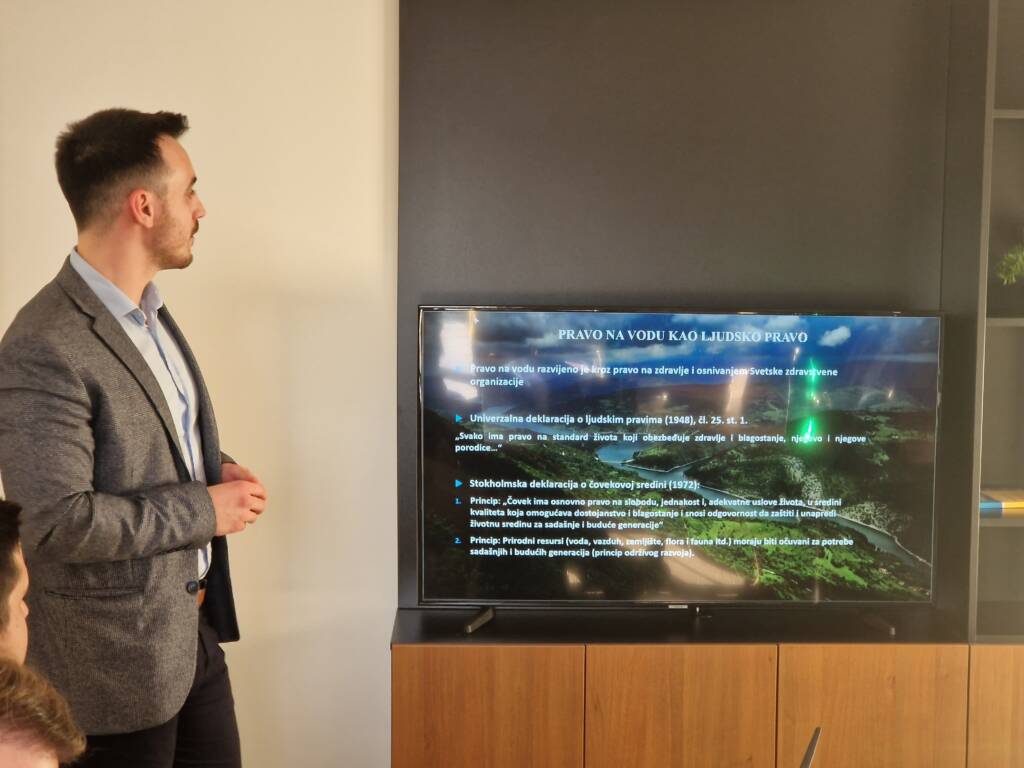Regional Center for Environmental Law (RCEL) hosted its first RCEL forum for discussion titled “Protecting the Right to Water: Impact of Pollution on the Danube River” on March 24, 2023. The event aimed to raise awareness about the environmental challenges of protecting the right to water and the challenges faced by the Danube River, as well as the need to protect this vital natural resource.
The Danube River, one of the largest and most important rivers in Europe, flows through ten countries and serves as a source of livelihood for millions of people. It not only supports vital transportation routes but also a wide range of ecosystems and biodiversity. Unfortunately, the Danube River faces numerous environmental challenges, including pollution from industrial, agricultural, and urban sources. Pollution of the Danube River in Serbia is a particularly concerning issue that negatively affects the health and well-being of communities that rely on it.
The event included an introductory speech by Danilo Radicevic, the Managing director of RCEL, who presented the RCEL forum for discussion and emphasized the importance of protecting the right to water and the challenges faced by the Danube River.
Predrag Dzamic, an attorney specializing in environmental and energy law, emphasized in his opening remarks that the right to water is a human right. After the introductory presentation, the entire legislative framework for protecting water and the Danube River was discussed. It was noted that the Republic of Serbia has not yet transposed directives in the field of water protection from diffuse pollution sources, including the most important Council Directive 91/271/EEC on urban wastewater treatment and Council Directive 91/676/EEC on the protection of waters against pollution caused by nitrates. It is encouraging that certain provisions from these directives are currently included in the new proposal for amendments and supplements to the Water Act. However, even after 12 years since the adoption of the Water Act, we still do not have a water management plan for the Danube River basin, which is mandatory under the law.
It was concluded at the event that states must approach holistically and logically the protection and management of rivers, such as the Danube River, without limiting themselves to territorial boundaries due to the nature and importance of this natural asset.
Said Predrag Džamić, a lawyer specializing in environmental law and energy
It was concluded at the event that in order to achieve real and effective environmental protection and its resources, it is necessary to adopt the Law on Liability for Environmental Damage, which transposes Directive 2004/35/EC. According to the National Program for the Adoption of European Union Legal Acquis (NPAA), the adoption of the Law on Liability for Environmental Damage is planned for the fourth quarter of 2023.
Industrial and municipal wastewater represents a major problem for the pollution of the Danube River. According to the latest data, only 6% of wastewater is treated, while the rest of the water is discharged directly into the Danube. Therefore, it is necessary to have facilities for treating industrial and municipal wastewater in the Danube River.
In practice, cross-border pollution cases, mainly caused by industrial accidents, pose a challenge, which requires all precautionary measures to be taken in accordance with the Convention on the Transboundary Effects of Industrial Accidents.
It was concluded at the event that states must approach the protection and management of rivers, such as the Danube River, holistically and logically, without limiting themselves to territorial boundaries due to the nature and significance of this natural resource. Progress has been made in this regard through the signing of the Convention on Cooperation for the Protection and Sustainable Use of the Danube River, and the establishment of the International Commission for the Protection of the Danube River. In this regard, the International Commission has adopted a Water Management Plan for the Danube River Basin and a Flood Risk Management Plan for the Danube River Basin for the period 2021-2027.
Additional questions that arose at the event were related to civil and administrative protection mechanisms. The main task of competent inspection bodies is to control the work of operators and examine whether they comply with the prescribed emission limits, and whether the current environmental pressure on the Danube River threatens to compromise the environmental quality standards of this recipient. Therefore, the issuance of water permits to operators, the implementation of environmental impact assessment procedures, and all other measures aimed at preserving and sustainably using the Danube River must be approached carefully and systematically.
Within the discussion, scenarios were considered for recognizing the Danube River as a legal entity, as is the case for some rivers in comparative law.







